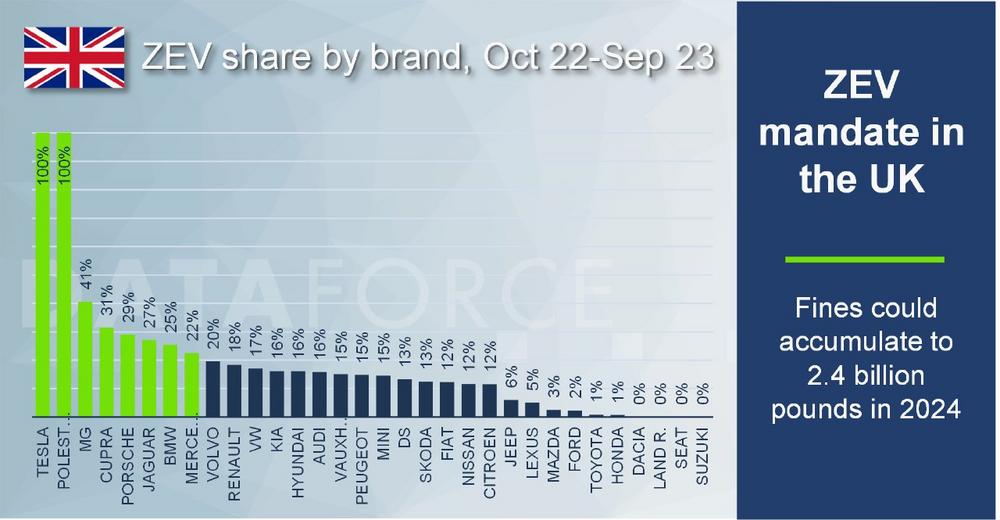The ZEV mandate in a nutshell
Each OEM will have to reach a minimum share of 22% Battery Electric Vehicles (BEVs) or other emission-free vehicles (FCEVs) in their sales mix. The share increases stepwise to 80% in 2030.
Vice versa, this means that the share of Internal Combustion Engine (ICE) cars must not exceed 78% of new registrations in 2024. Manufacturers above this threshold will be fined 15,000 GBP per additional car.
For example, if an OEM registers 10,000 cars, only 7,800 can come with petrol, diesel, hybrid or gas engines. Should the OEM register 2,000 BEVs and 8,000 petrol cars, it will be charged a fine of 200 x 15,000 GBP = 3 million GBP.
Flexibility mechanisms can help a manufacturer to get additional allowances for ICE cars. Most prominently, OEMs with spare allowances can sell them to others and a brand can borrow allowances from a year in the future. However, the buying option also comes with additional expenses, while the borrowing means the brand will have to overtake the annual increase in BEV shares set in the law.
Resulting fines in worst case scenario
Dataforce calculated possible fines using the new registrations of the last 12 months (Oct 22 to Sep 23). Additional allowances through flexibility mechanisms are not considered. In this worst-case scenario, fines accumulate to 2.4 billion GPB (2.8 billion EUR).
This is also a good example how averages can be misleading. When calculating fines through the average 18% BEV share in the UK, the fines would be “only” 1.5 billion GBP.
Zooming into brand level, Ford and Toyota as two of the largest OEMs in the UK would pay the highest fines, followed by Land Rover, Nissan and Audi. While 100% BEV brands obviously do not pay fines (and can even generate additional revenue from selling allowances), there are also a couple of mixed BEV/ICE brands that already have sufficiently high electric shares, namely BMW, Cupra, Jaguar, Mercedes, MG and Porsche.
Conclusions
The ZEV mandate will be an effective mechanism to accelerate electrification in the UK despite the push back of the ICE ban to 2035. Facing the thread of hundreds of millions of fines, OEMs and dealerships will do all they can to push their EV range. Still, this is only the supply point of view. And while financial incentives have led to a soaring BEV demand from fleets, private customers are still reluctant. High upfront costs, a doubling of electricity prices at charging stations and the cost-of-living crisis delayed the BEV uptake in the retail channel. In fact, private BEV registrations where down by 10% Jan-Sep 2023. If this trend is not reversed quickly manufacturers may be forced to retain ICE deliveries at the end of 2024. Depending on CO2-compliance for 2023, it can also be a valid strategy to hold back BEVs at the end of this year in order to push their share in 2024.
As a leading market research company, we bring transparency to the European automotive market. Independent – with over 25 years of experience – we set standards and make markets comparable.
Dataforce Verlagsgesellschaft für Business Informationen mbH
Hamburger Allee 14
60486 Frankfurt am Main
Telefon: +49 (69) 95930-0
Telefax: +49 (69) 95930-333
http://www.dataforce.de
Marketing Manager
Telefon: +49 (69) 95930-353
Fax: +49 (69) 95930-549
E-Mail: jelena.bergmann@dataforce.de
Kontakt für Presse
Telefon: +49 (69) 95930-232
Fax: +49 (69) 95930-333
E-Mail: Benjamin.Kibies@dataforce.de
![]()
